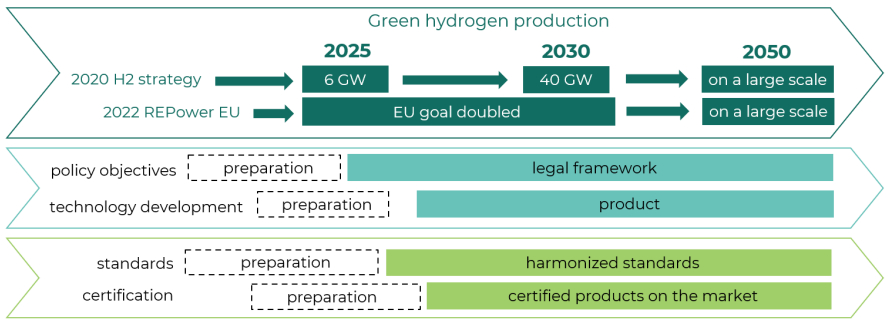// Documenti disponibili n: 46.457
// Documenti scaricati n: 36.417.726
ID 19097 | 01.03.2023
The European Clean Hydrogen Alliance (ECH2A) brings together industry, public authorities, civil society and other stakeholders to support the large-scale deployment of clean hydrogen technologies by 2030. ECH2A identified, soon after its launch, the need for a robust and harmonised standardisation framework.
That led to the creation of a dedicated Working Group (WG) on hydrogen standardisation in February 2022. This WG on Standardisation was tasked with the development of a standardisation roadmap and as a result it was able to:
- make a comprehensive analysis of ongoing hydrogen related standardisation activities;
- establish a comprehensive overview of standardisation gaps/priorities and needs along the whole value chain;
- increase information exchange about and improve the awareness of, future and ongoing standardisation activities;
- streamline standardisation ideas emanating from different initiatives;
- schedule topics in a timeline;
Common European and international hydrogen standards are key to the successful roll out of hydrogen technologies and applications. Considering the complexity of the technologies as well as the time needed to develop standards representing the ‘State of the Art’ (typically requiring a few years), a development plan with priorities for such standards should be established and be initiated as soon as possible.
It is essential that standards are developed in a timely fashion ensuring alignment with the legal/regulatory framework and development of technologies.

Figure 1: Policy framework in relation to development of hydrogen technologies
In the roadmap, more than 400 topics are listed and are “clustered” along the segments of the hydrogen value-chain.
A simple visualisation tool is proposed to quickly identify the state of play of standardisation activities. Some segments are already well addressed (mentioned as “under development”) such as gas cylinders and building-residential applications meaning that most of these standards should be in place soon. Whereas a few other segments such as industry (commercial/industrial/process heat) and mobility (aviation, maritime and heavy-duty and road vehicles) will require the development of new standards.
Finally, the prioritisation work allowed to identify issues for which pre-normative research activities are needed; to name a few; safety aspects (e.g. material compatibility, leakage) or issues linked to different energy carriers.
Beyond the identification of individual standardisation topics, the WG on Standardisation identified in the roadmap a number of issues, namely complementary needs that are required to facilitate the implementation. The most important ones are the following:
a. A clear regulatory framework to give direction to the detailed standardisation work;
b. The publication of standardisation requests, which are mandates of the European Commission to prepare specific standards;
c. The engagement of industry in topics that “need to be developed” and/or topics for which no standardisation committees are exist or are yet active; furthermore, a good information exchange with associations such as Hydrogen Council, IPHE, IRENA, Hydrogen Europe and others is needed;
d. The need for an overall coordination of hydrogen standardisation activities focusing on the technical needs of industry; the alignment with European Commission policies and legislation and the implementation capacity of CEN-CENELEC;
e. Increased cooperation between European and international standardisation bodies based on the existing agreements (Vienna / Frankfurt agreement).
Finally, the WG on Standardisation issued a set of key actions which should pave the way for new hydrogen standards to accelerate the roll out of large-scale hydrogen solutions.
[...]
Fonte: EC
Testata editoriale iscritta al n. 22/2024 del registro periodici della cancelleria del Tribunale di Perugia in data 19.11.2024